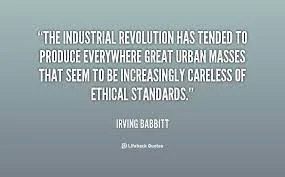The Mindset of Leaders and Economic Prosperity
By the 18th century, iron and coal became examples of industries that were capitalist in peculiar ways.
From inception both industries were capitalist inclined,since they required heavy expenditure for the actual process of production.
The labor force comprised of wage earners working for a master and were not owners of the forge, iron ore or coalmine.
Similarly, as early as the 17th century, a sizable number of comparatively small industries emerged namely,soap,brewing, glass and salt-making industries.
However, during this period the interest in agriculture was still very strong,with the handicraft men more prominent than the industrial or commercial capitalist.
In the second half of the 18th century, the growth of the population prompting the increase in the demand for goods, improved transportation system, unprecedented mechanical inventions, new materials and improved chemical processes resulted in the industrial revolution.
Industries such as coal and hardware made use of increased quantities of coal, just as coal was also used as fuel.
After the repeal of the General Export Duty in 1834, coal and iron became foremost in the export market.
Birmingham, Sheffield and Glasgow known for cotton experienced economic growth between 1821 and 1831.
Sadly,in Nigeria today, despite the presence of all the factors that prompted the industrial revolution in Britain and the large deposits of coal,iron ore and several other mineral resources in different parts of the country, Nigeria is still largely import dependent for most of its needs. The poverty rate in Nigeria is now 50 per cent in 2021 as a result of misplaced priorities, mediocrity and incompetence.
Indeed,the colored race are the major investors in biscuits,sweets,detergents and furniture.
Exploitation of labor, austere wages, poor working conditions and other sharp practices, have all contributed to the survival of these investors.
Interestingly,the distribution of soft drinks produced in plastics, questionable alcoholic drinks in sachets among others are now the choice of business inclined Nigerians.
Those-in-Charge are now tinkering with the idea of vigorously promoting activities in the agricultural sector, despite years of neglect and in the middle of unabating killings(for ritual purposes inclusive), kidnappings and other forms of violence in 2021,while Britain ceased to be primarily agricultural in the second half of the 18th century.
The consensus among focused and development inclined leaders,is that the mindset of those that formulated policies to a great extent determines the economic fortunes and prosperity of countries of the world.





Comments
Post a Comment